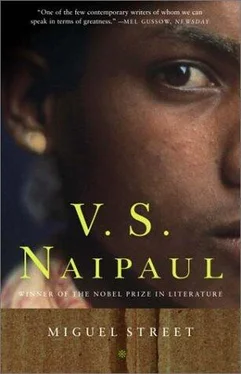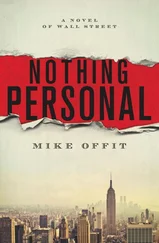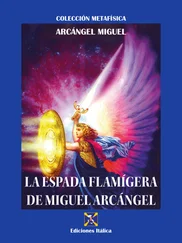‘She dey,’ Bogart said, meaning that she was all right.
‘Ah know she dey,’ Hat said. ‘But how she dey? ’
‘Well, she cleaning and cooking.’
‘For everybody?’
‘Everybody.’
Elias had a room of his own which he never left whenever he came home. He ate his meals outside. He was trying to study for some important exam. He had lost interest in his family, Bogart said, or rather, implied.
George was still drinking a lot; but he was prospering. He was wearing a suit now, and a tie.
Hat said, ‘He must be making a lot of money, if he have to bribe all the policemen and them.’
What I couldn’t understand at all, though, was the way these new women behaved to George. They all appeared to like him as well as respect him. And George wasn’t attempting to be nice in return either. He remained himself.
One day he said to everyone, ‘Dolly ain’t have no mooma now. I have to be father and mother to the child. And I say is high time Dolly get married.’
His choice fell on a man called Razor. It was hard to think of a more suitable name for this man. He was small. He was thin. He had a neat, sharp moustache above neat, tiny lips. The creases on his trousers were always sharp and clean and straight. And he was supposed to carry a knife.
Hat didn’t like Dolly marrying Razor. ‘He too sharp for we,’ he said. ‘He is the sort of man who wouldn’t think anything about forgetting a knife in your back, you know.’
But Dolly still giggled.
Razor and Dolly were married at church and they came back to a reception in the pink house. The women were all dressed up, and there were lots of American soldiers and sailors drinking and laughing and congratulating George. The women and the Americans made Dolly and Razor kiss and kiss, and they cheered. Dolly giggled.
Hat said, ‘She ain’t giggling, you know. She crying really.’
Elias wasn’t at home that day.
The women and the Americans sang Sweet Sixteen and As Time Goes By. Then they made Dolly and Razor kiss again. Someone shouted, ‘Speech!’ and everybody laughed and shouted, ‘Speech! Speech!’
Razor left Dolly standing by herself, giggling.
‘Speech! Speech!’ the wedding guests called.
Dolly only giggled more.
Then George spoke out. ‘Dolly, you married, it true. But don’t think you too big for me to put you across my lap and cut your tail.’ He said it in a jocular manner, and the guests laughed.
Then Dolly stopped giggling and looked stupidly at the people.
For a moment so brief you could scarcely measure it there was absolute silence; then an American sailor waved his hands drunkenly and shouted, ‘You could put this girl to better work, George.’ And everybody laughed.
Dolly picked up a handful of gravel from the yard and was making as if to throw it at the sailor. But she stopped suddenly, and burst into tears.
There was much laughing and cheering and shouting.
I never knew what happened to Dolly. Edward said one day that she was living in Sangre Grande. Hat said he saw her selling in the George Street Market. But she had left the street, left it for good.
As the months went by, the women began to disappear and the numbers of jeeps that stopped outside George’s house grew smaller.
‘You gotta be organised,’ Hat said.
Bogart nodded.
Hat added, ‘And they have lots of nice places all over the place in Port of Spain these days. The trouble with George is that he too stupid for a big man.’
Hat was a prophet. Within six months George was living alone in his pink house. I used to see him then, sitting on the steps, but he never looked at me any more. He looked old and weary and very sad.
He died soon afterwards. Hat and the boys got some money together and we buried him at Lapeyrouse Cemetery. Elias turned up for the funeral.
After midnight there were two regular noises in the street. At about two o’clock you heard the sweepers; and then, just before dawn, the scavenging-carts came and you heard the men scraping off the rubbish the sweepers had gathered into heaps.
No boy in the street particularly wished to be a sweeper. But if you asked any boy what he would like to be, he would say, ‘I going be a cart-driver.’
There was certainly a glamour to driving the blue carts. The men were aristocrats. They worked early in the morning and had the rest of the day free. And then they were always going on strike. They didn’t strike for much. They struck for things like a cent more a day; they struck if someone was laid off. They struck when the war began; they struck when the war ended. They struck when India got independence. They struck when Gandhi died.
Eddoes, who was a driver, was admired by most of the boys. He said his father was the best cart-driver of his day, and he told us great stories of the old man’s skill. Eddoes came from a low Hindu caste, and there was a lot of truth in what he said. His skill was a sort of family skill, passing from father to son.
One day I was sweeping the pavement in front of the house where I lived, and Eddoes came and wanted to take away the broom from me. I liked sweeping and I didn’t want to give him the broom.
‘Boy, what you know about sweeping?’ Eddoes asked, laughing.
I said, ‘What, it have so much to know?’
Eddoes said, ‘This is my job, boy. I have experience. Wait until you big like me.’
I gave him the broom.
I was sad for a long time afterwards. It seemed that I would never never grow as big as Eddoes, never have that thing he called experience. I began to admire Eddoes more than ever; and more than ever I wanted to be a cart-driver.
But Elias was not that sort of boy.
When we who formed the Junior Miguel Street Club squatted on the pavement, talking, like Hat and Bogart and the others, about things like life and cricket and football, I said to Elias, ‘So you don’t want to be a cart-driver? What you want to be then? A sweeper?’
Elias spat neatly into the gutter and looked down. He said very earnestly, ‘I think I going be a doctor, you hear.’
If Boyee or Errol had said something like that, we would all have laughed. But we recognised that Elias was different, that Elias had brains.
We all felt sorry for Elias. His father George brutalised the boy with blows, but Elias never cried, never spoke a word against his father.
One day I was going to Chin’s shop to buy three cents’ worth of butter, and I asked Elias to come with me. I didn’t see George about, and I thought it was safe.
We were just about two houses away when we saw George. Elias grew scared. George came up and said sharply, ‘Where you going?’ And at the same time he landed a powerful cuff on Elias’s jaw.
George liked beating Elias. He used to tie him with rope, and then beat him with rope he had soaked in the gutters of his cow-pen. Elias didn’t cry even then. And shortly after, I would see George laughing with Elias, and George used to say to me, ‘I know what you thinking. You wondering how me and he get so friendly so quick.’
The more I disliked George, the more I liked Elias.
I was prepared to believe that he would become a doctor some day.
Errol said, ‘I bet you when he come doctor and thing he go forget the rest of we. Eh, Elias?’
A small smile appeared on Elias’s lips.
‘Nah,’ he said. ‘I wouldn’t be like that. I go give a lot of money and thing to you and Boyee and the rest of you fellows.’ And Elias waved his small hands, and we thought we could see the Cadillac and the black bag and the tube-thing that Elias was going to have when he became a doctor.
Elias began going to the school at the other end of Miguel Street. It didn’t really look like a school at all. It looked just like any house to me, but there was a sign outside that said:
Читать дальше












